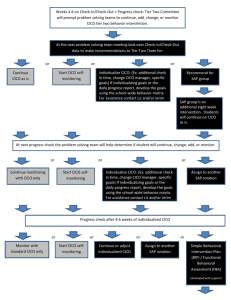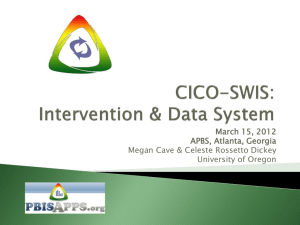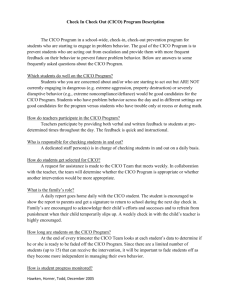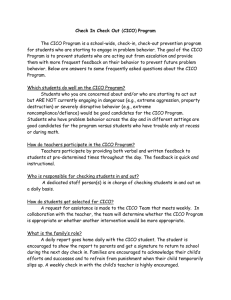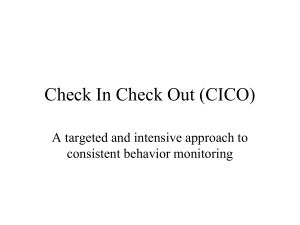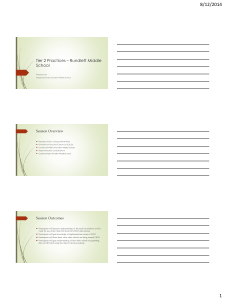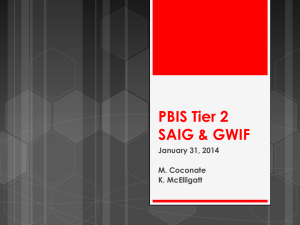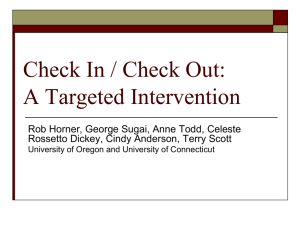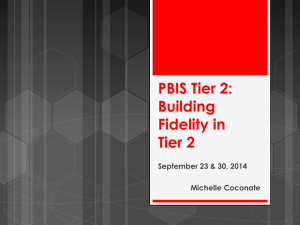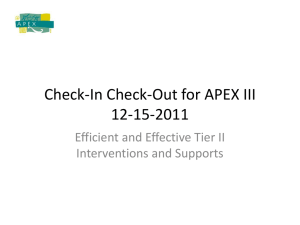EUSD PBIS CICO Presentation
advertisement
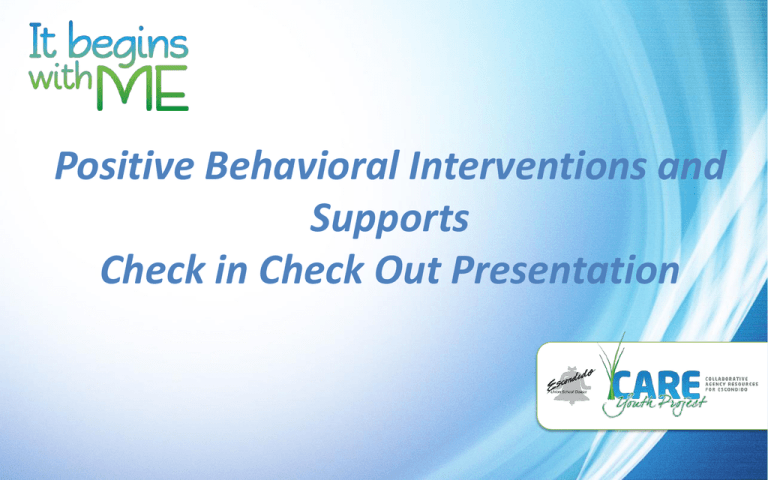
Positive Behavioral Interventions and Supports Check in Check Out Presentation Definition of CICO CICO is an evidenced-based Tier II intervention program designed to provide students with regular, targeted feedback on their behavior to increase positive choicemaking and prevent future behavior. CICO Daily Activities • • Student checks in with a CICO Mentor in the morning Student carries a point card that is based on PBIS behavior expectations – Student turns in previous day’s signed card – Student picks up new card • Student presents card to teacher(s) at regularly scheduled intervals throughout the day – Teacher acknowledges student for checking in – Teacher rates and provides behavioral feedback • Student check out with CICO Mentor at the end of the day – CICO mentor reviews goals – CICO mentor provides encouragement • Student brings card home for parent signature – Parent signs card – Parent acknowledges and encourages CICO Video Presentation CICO Key Features • Increased positive adult contact • Embedded social skills training • Reinforcement of school-wide expectations • Frequent behavioral feedback • Daily home/school communication CICO Works • • • • • • • Provides structure Sets student up for success Mitigates effects of setting events Creates mechanism for feedback Ties reinforcement to specific behavior Links home and school support Encourages self-monitoring Recruitment of CICO Mentors • Send out informational invitation to all staff • Market to PBIS team members • Enlist administrators as CICO mentors • Accept substitute CICO mentors • Recognize the CICO mentors regularly Training of CICO Mentors • Hold morning or afterschool meeting with CICO mentors • Focus on building positive relationships • Provide all needed tools – – – – Point cards Attendance log Example dialogue Reinforcement ideas/plan Communication with Parents • Send information on the CICO program and parent responsibilities • Obtain parent consent using CARE Youth Project Request for School-based Services Form • Maintain regular contact with parent on student progress Communication with Teachers • Meet with classroom teacher(s) • Customize point card – Identify student goals • Review teacher responsibilities – Providing rating at designated times – Provide reminders to check in and out – Provide support and encouragement CICO Point Sheet Points Possible = Daily Goal = Student Goal = Point Total = 2 – Every time 1 – With 1 reminder 0 – More than 1 reminder Student: Teacher: Behavior Expectations Language Arts Math Rotations Science Social Studies 2 1 0 2 1 0 2 1 0 2 1 0 2 1 0 2 1 0 2 1 0 2 1 0 2 1 0 2 1 0 2 1 0 2 1 0 2 1 0 2 1 0 2 1 0 1.Be Safe • • Kept hands and feet to yourself Used break card 2. Be Respectful • • Raised hand Used attention signal 3. Be Responsible • • Completed classwork Completed alternate assignment Parent Signature 30 24 _____ _____ Training of CICO Students • • • • Meet at scheduled time with new CICO students Review point card Practice examples/non-examples of meeting goals Review responsibilities – – – – Remember where and when to check in and out Keep track of point card Remind teacher to assign points Bring point card home for parent signature CICO Point Sheet Points Possible = Daily Goal = Student Goal = Point Total = 2 – Every time 1 – With 1 reminder 0 – More than 1 reminder Student: Teacher: Behavior Expectations Language Arts Math Rotations Science Social Studies 2 1 0 2 1 0 2 1 0 2 1 0 2 1 0 2 1 0 2 1 0 2 1 0 2 1 0 2 1 0 2 1 0 2 1 0 2 1 0 2 1 0 2 1 0 1.Be Safe • • Kept hands and feet to yourself Used break card 2. Be Respectful • • Raised hand Used attention signal 3. Be Responsible • • Completed classwork Completed alternate assignment Parent Signature 30 24 _____ _____ Contact Information Tracy Schmidt Clinical Coordinator CARE Youth Project trschmidt@eusd.org www.careyouth.org
